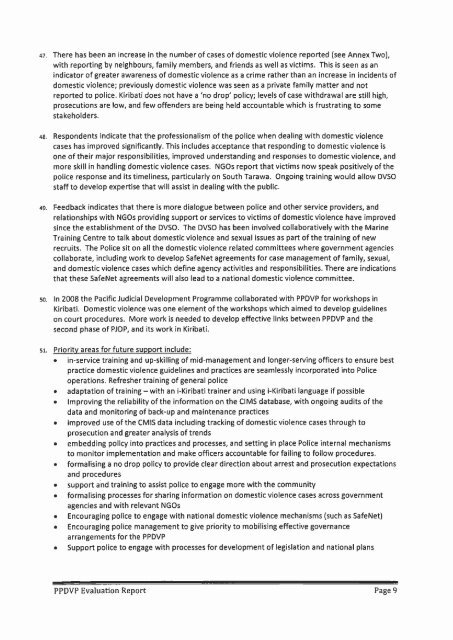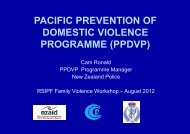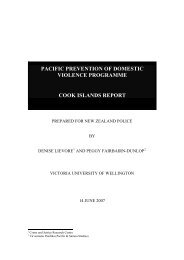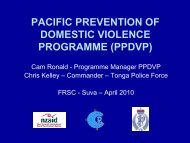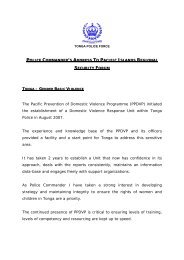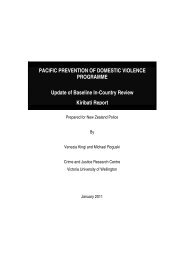PPDVP Evaluation Report - Pacific Prevention of Domestic Violence ...
PPDVP Evaluation Report - Pacific Prevention of Domestic Violence ...
PPDVP Evaluation Report - Pacific Prevention of Domestic Violence ...
You also want an ePaper? Increase the reach of your titles
YUMPU automatically turns print PDFs into web optimized ePapers that Google loves.
47. There has been an increase in the number <strong>of</strong> cases <strong>of</strong> domestic violence reported (see Annex Two),with reporting by neighbours, family members, and friends as well as victims. This is seen as anindicator <strong>of</strong> greater awareness <strong>of</strong> domestic violence as a crime rather than an increase in incidents <strong>of</strong>domestic violence; previously domestic violence was seen as a private family matter and notreported to police. Kiribati does not have a 'no drop' policy; levels <strong>of</strong> case withdrawal are still high,prosecutions are low, and few <strong>of</strong>fenders are being held accountable which is frustrating to somestake holders.48. Respondents indicate that the pr<strong>of</strong>essionalism <strong>of</strong> the police when dealing with domestic violencecases has improved significantly. This includes acceptance that responding to domestic violence isone <strong>of</strong> their major responsibilities, improved understanding and responses to domestic violence, andmore skill in handling domestic violence cases. NGOs report that victims now speak positively <strong>of</strong> thepolice response and its timeliness, particularly on South Tarawa. Ongoing training would allow DVSOstaff to develop expertise that will assist in dealing with the public.49. Feedback indicates that there is more dialogue between police and other service providers, andrelationships with NGOs providing support or services to victims <strong>of</strong> domestic violence have improvedsince the establishment <strong>of</strong> the DVSO. The DVSO has been involved collaboratively with the MarineTraining Centre to talk about domestic violence and sexual issues as part <strong>of</strong> the training <strong>of</strong> newrecruits. The Police sit on all the domestic violence related committees where government agenciescollaborate, including work to develop SafeNet agreements for case management <strong>of</strong> family, sexual,and domestic violence cases which define agency activities and responsibilities. There are indicationsthat these SafeNet agreements will also lead to a national domestic violence committee.so.In 2008 the <strong>Pacific</strong> Judicial Development Programme collaborated with <strong>PPDVP</strong> for workshops inKiribati. <strong>Domestic</strong> violence was one element <strong>of</strong> the workshops which aimed to develop guidelineson court procedures. More work is needed to develop effective links between <strong>PPDVP</strong> and thesecond phase <strong>of</strong> PJDP, and its work in Kiribati.51. Prioritv areas for future support include:in-service training and up-skilling <strong>of</strong> mid-management and longer-serving <strong>of</strong>ficers to ensure bestpractice domestic violence guidelines and practices are seamlessly incorporated into Policeoperations. Refresher training <strong>of</strong> general policeadaptation <strong>of</strong> training - with an i-Kiribati trainer and using i-Kiribati language if possibleImproving the reliability <strong>of</strong> the information on the ClMS database, with ongoing audits <strong>of</strong> thedata and monitoring <strong>of</strong> back-up and maintenance practicesimproved use <strong>of</strong> the CMlS data including tracking <strong>of</strong> domestic violence cases through toprosecution and greater analysis <strong>of</strong> trendsembedding policy into practices and processes, and setting in place Police internal mechanismsto monitor implementation and make <strong>of</strong>ficers accountable for failing to follow procedures.formalising a no drop policy to provide clear direction about arrest and prosecution expectationsand proceduressupport a'nd training to assist police to engage more with the communityformalising processes for sharing information on domestic violence cases across governmentagencies and with relevant NGOsEncouraging police to engage with national domestic violence mechanisms (such as SafeNet)a Encouraging police management to give priority to rnobilising effective governancearrangements for the <strong>PPDVP</strong>a Support police to engage with processes for development <strong>of</strong> legislation and national plans<strong>PPDVP</strong> <strong>Evaluation</strong> <strong>Report</strong> Page 9


